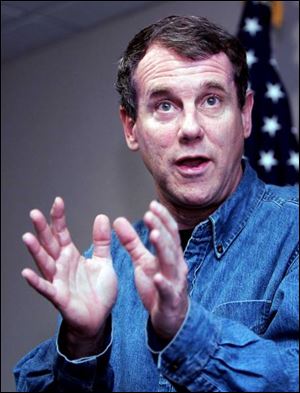
Brown vows to help Senate move on
11/9/2006
Sherrod Brown says the voters are owed legislation from a bipartisan Congress.
COLUMBUS - Mike DeWine and Sherrod Brown found one last thing to disagree over on the day after their U.S. Senate race ended: whether a Democratic congressional majority would bring gridlock or progress to Washington.
After surging to a House majority on Election Night, Democrats apparently grabbed control of the Senate late last night and would control both chambers on Capitol Hill. The clincher is in Virginia, where the Democratic challenger clung to a less-than 10,000 vote lead in a race that could get a recount.
Mr. Brown, a Democratic congressman from Avon, helped his party gain ground in the Senate by unseating Mr. DeWine, a two-term Republican.
In interviews yesterday, Mr. Brown and Mr. DeWine - who argued for months over taxes, trade, security, and other issues - painted very different pictures of how a Democratic House and Senate would operate with President Bush, a Republican.
Echoing national party leaders, Mr. Brown said Democrats would work with Republicans to send Mr. Bush legislation to increase the federal minimum wage, implement national security recommendations of the bipartisan 9/11 commission, strengthen congressional ethics rules, help families pay for college, and lower the cost of prescription drugs.
He said he and other Democrats would work with Republican critics of the administration's Iraq strategy, such as Sens. Chuck Hagel (R., Neb.) and John Warner (R., Va.).
"We owe it to the voters to immediately put bipartisan legislation on the floor," Mr. Brown said.
Mr. DeWine themed his campaign on his record of working across party lines to get things done. With his loss, and that of moderate Sen. Lincoln Chafee (R., R.I.), Mr. DeWine said he feared the Senate had lost some of its bipartisan appetite.
He said the likely Majority Leader in a Democratic-run Senate, Sen. Harry Reid of Nevada, had not shown an affinity for bipartisanship.
"I hope there will be some common ground found," Mr. DeWine said. "As I've said during this campaign, I truly believe that Democrats and Republicans can work together• •my fear is that there will be gridlock."
Exit polls reported by the Associated Press suggested pocketbooks, not partisanship, steered voters to Mr. Brown.
The polls showed the economy influenced voters' decisions more than any issue, and that Mr. Brown - whose populist campaign included calls to restructure tax codes to boost the middle class and renegotiate international trade agreements to protect American workers - won by a large margin among voters who called the economy very important to their selection.
Mr. Brown said his economic theme struck a particular chord with rural voters who have not recently voted Democratic. "That's what won," he said. "In rural areas, we did very well because of our message."
Mr. DeWine said anger at Mr. Bush and outgoing Gov. Bob Taft sank him. "We had a huge national trend and a huge state trend," he said. "In the end, we probably could have survived one, but not both."
The rivals did find one thing to agree on yesterday: cheering the resignation of Secretary of Defense Donald Rumsfeld, whom both Mr. DeWine and Mr. Brown criticized on the campaign trail for his handling of the Iraq war.
Contact Jim Tankersley at:
jtankersley@theblade.com
or 419-724-6134.